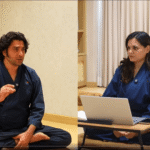The Path of the Aranyaka Bhikshu: Insights from Ekotara Agama 20.7 with Dr. Lim Siow Jin
On June 15, 2025, a deeply enriching live session was held with Dr. Lim Siow Jin, who offered profound insights into Ekotara Agama 20.7—a sūtra that explores the meditative life of an aranyaka bhikshu (forest-dwelling monk). The discourse centered on the path of deep meditation, ethical living, and the journey toward complete liberation.
Mastery Through Samatha
Dr. Lim emphasized the transformative power of samatha—tranquility meditation. When the aranyaka bhikshu perfects samatha, his mind becomes stable, calm, and unified. From this stillness arises:
- Mastery over shila (moral discipline): Natural adherence to ethical precepts.
- Freedom from transgression: A purified mind avoids actions that violate the Dharma.
- Wholesome action: Conduct rooted in compassion, wisdom, and harmlessness.
Samatha is not an endpoint, but a vital preparatory ground for deeper insight.
Liberation Through Vipasyana
With a focused mind, the bhikshu transitions to vipasyana—insight meditation. This leads to:
- Contemplation of suffering’s origins: Seeing the roles of craving, clinging, and ignorance.
- Realization of cessation: Understanding that the end of suffering is possible.
- Embracing the Noble Eightfold Path: Walking the direct route to liberation.
Through this meditative clarity, the bhikshu overcomes three core defilements:
- Desire (rāga)
- Existence (bhava)
- Ignorance (avidyā)
Knowledge of Liberation
The culmination of the path is the knowledge of liberation. The bhikshu realizes:
“Birth is exhausted. The noble life has been lived. What was to be done has been done. The cycle of existence has come to an end.”
Ekotara Agama 20.10: Two Acts of Sacred Merit
In a continuation of the session, Dr. Lim also explored Ekotara Agama 20.10, which highlights two powerful acts that generate immense spiritual merit:
1. Serving and Supporting One’s Parents
This ancient teaching affirms that filial duty is a sacred Dharma practice. Honoring one’s parents:
- Cultivates humility and gratitude.
- Brings both worldly and spiritual benefits.
- Strengthens one’s foundation on the path.
2. Supporting a Bodhisattva One Lifetime from Buddhahood
To support such a being is to align oneself with the essence of enlightenment. This act:
- Accumulates vast merit.
- Supports the liberation of countless beings.
- Reflects one’s own inner potential for Buddhahood.
These acts are not merely ethical—they are spiritual gateways to awakening. They guide us to serve with wisdom, act with compassion, and train our minds in the Dharma.
Conclusion: Liberation Through Practice and Service
This dual discourse, as presented by Dr. Lim Siow Jin, beautifully connects meditative discipline with relational virtue. It shows that true liberation arises not just in solitary meditation, but also in heartfelt service to those who gave us life and to those guiding us on the path.
By cultivating tranquility and insight, and by honoring parents and Bodhisattvas, we move toward awakening—step by mindful step.
👉 Watch the full session here: https://www.facebook.com/drsavera/videos/677338882001396/



